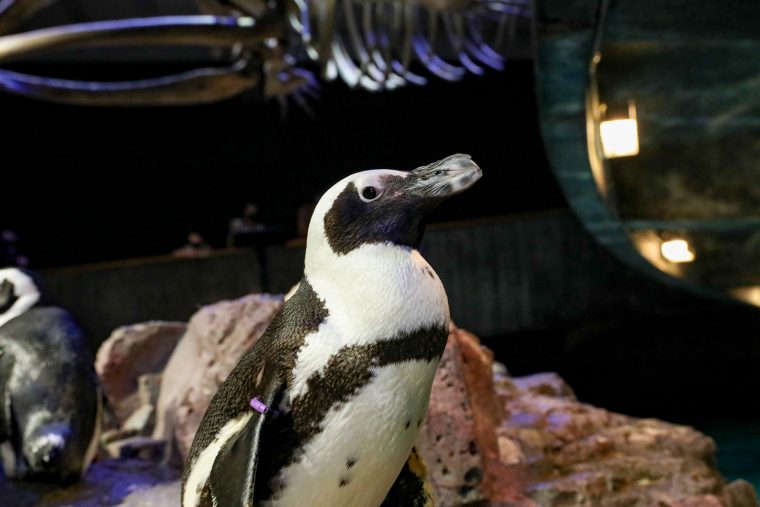African penguin hatched at Aquarium in 1992, has doubled life expectancy of penguins in South Africa

BOSTON, MASS. (Nov. 10, 2022) – One of the New England Aquarium’s African penguins reached another hatch day milestone, turning 30 this week. “Harlequin” hatched at the Aquarium on November 8, 1992, making her the sixth-oldest of the geriatric penguins in the Aquarium’s care.
**PHOTOS AND VIDEO AVAILABLE HERE, WITH CREDIT TO NEW ENGLAND AQUARIUM**
“Harlequin is bold, but not too bold, curious, but not too curious, can be handled, but doesn’t overly seek it out,” said Amanda Barr, the Aquarium’s senior penguin trainer. “She’s just really well rounded and a really great bird.”
Harlequin is known for eating well and typically hangs out near the trainer’s bucket for most of feeding time. Her favorite fish appears to be anchovies. She likes to explore and will sometimes be found spending time on other islands rather than in her normal territory. Harlequin is most easily identified by the purple bracelet on her right wing. Her mate, Durban, has a purple bracelet on his left wing. Harlequin and Durban, who will be 29 in February, have been a pair since 2000. They are typically independent throughout the day but always reunite in the evening when they can be seen swimming together. The pair have raised eight chicks.
African penguins are an endangered species and have a life expectancy of 10 to 15 years in the wild. The New England Aquarium is proud to care for several older penguins in their 30s and 40s, including “Deco,” “Lambert,” and “Pomona.” To keep the aging penguins happy and healthy, the trainers and Animal Health Department staff are in constant communication about the birds and collaborate on behavioral training to help administer appropriate treatments. This includes feeding older penguins hydrated fish that have been injected with extra water to promote kidney health, administering daily eye drops, applying foot treatments to prevent infections, and doing acupuncture and physical therapy.
Careful records are kept on each penguin’s behavior, feedings, and more so that staff can quickly spot changes that might be indicative of needing treatment. Along with keeping a close eye on the penguins daily, the team performs more formal health checks on the colony regularly. During these exams, staff are keeping an eye out for common ailments that afflict older penguins, including foot injuries and cataracts, as well as checking each penguin’s weight.
Penguin colonies along the coasts of South Africa and Namibia are threatened by the depletion of food from overfishing, climate change, and pollution. Over the last 30 years, the number of endangered African penguins breeding in South Africa has declined by 73% from 42,500 breeding pairs in 1991 to 10,400 pairs in 2021. The New England Aquarium participates in the African Penguin Species Survival Plan through the Association of Zoos and Aquariums (AZA), which supports field conservation efforts and a thoughtful breeding program to help promote a sustainable future for these penguins. To learn more about the AZA’s efforts to keep the African penguin from going extinct, visit the African penguin Saving Animals From Extinction (SAFE) site.
MEDIA CONTACT:
Pam Bechtold Snyder – psnyder@neaq.org, 617-686-5068
